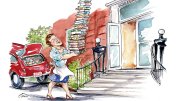1911
Harvard College dean Byron S. Hurlbut notes in his annual report that students in the past year averaged more than 30 class absences apiece. The Bulletin’s editors remark that all colleges contain students too stupid to gain anything near a perfect course grade, “but even stupidity is no obstacle to perfection in regularity of attendance.”
1926
The athletic authorities of Yale, Princeton, and Harvard agree to charge $5 a ticket for their football games, prompting an alumnus to write: “I decidedly revolt against the idea of a son of mine…going to a college that is symbolized by a $5 football ticket.”
1951
Burlesque queen Sally Rand appears at the Freshman Smoker and lectures the class of ’54 on the evils of Communism.
1956
With women now admitted to morning prayers in Appleton Chapel, the Preacher to the University reports that attendance is up so sharply, he may move the service to Memorial Church.
1971
The Harvard Corporation sanctions the Harvard-Radcliffe “non-merger” merger previously approved by the Trustees and Council of Radcliffe. The plan is designed to facilitate “full and equal participation of Radcliffe students in the informal as well as the academic life of the College.” Concurrently, Radcliffe president Mary I. Bunting announces plans to resign in 1972.
1976
The Lampoon celebrates its centennial with “a weekend extravaganza,” seceding from the Union, designating itself the State of Lampoon, and applying for membership in the United Nations. (Secretary General Kurt Waldheim allegedly refuses admission on the grounds that the UN is “enough of a circus already.”) Undaunted, the State of Lampoon presents the Funniest Professor of the Century Award to John Kenneth Galbraith, who receives a purple-and-gold Eldorado Cadillac, a trip to Las Vegas, and $10,000.
1986
In an article on “Building Better Professionals,” the editors note that the M.B.A. candidates graduating in June are the first class required to use personal computers for assignments.








